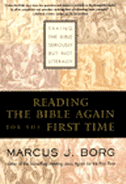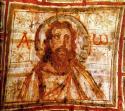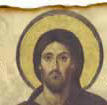
This course was first held in the fall of 2001 and then in Lent of 2004. All are welcome to the materials. General Internet Research Links and those related to this book are listed below.




| It is recommended to click the Refresh or Reload button each page to ensure current information. |
| Reading the Bible Again for the First Time - Marcus Borg |
|||
 |
Chapter Notes Pages | Bio of Borg |
Review of Book |
| Purpose of the Course To address the present conflict about the Bible within the church and
to provide Christians with a persuasive way of seeing and reading the sacred
scriptures; a way that takes the Bible seriously without taking it literally.
Using the model of mutual respect, come expecting to discover and clarify
what you believe; in an environment where faithful expression, listening
and honouring others' views will be emphasised. We will attempt an honest
and creative learning dialogue in a climate of tolerance. This course was first held in the fall of 2001 and then in Lent of 2004. All are welcome to the materials. General Internet Research Links and those related to this book are listed below. |
|||
| The St. David's Forum is registered St. David's with Yahoo Groups. It is a place of discussion of subjects of Christian adult education. Click Yahoo left to visit and read. You may join there, or email Jock or Wayne requesting to be added to the list. About 80 folks participate on this lively list. | |||
 |
Collection of Internet Links for the Book Studies in the Holy Manners Series - background, papers, books, author sites, etc.. | ||
 |
The references listed below and linked to the image to the left are gathered by the United Methodist Women In Mission as part of a Bible Study of their own. Highly useful. Do visit. | ||
| Includes excellent reference links: Ancient Life in the Near East, Atlases and Chronological Charts, Bible Commentaries and References, Biblical Interpretation and Authority, Biblical Studies, Church History, Dead Sea Scrolls, Nag Hammadi Library, Other Extra-Canonical Literature, Liturgical, Worship, and Art Resources, Spiritual Formation and Scripture. | |||
 |
This site, "A Portrait of Jesus - from Galilean Jew to the face of God" at the United Theological Seminary of Ohio, is brought to our attention by Marilyn from the Yahoo discussion group. It is an extended review of Jesus material based largely on the work of Marcus Borg. There is audio on site, and summaries of many readers opinions worth reading on the topics of the study. Well worth visiting and bookmarking. There are also excellent reference links to be found here. | ||
 |
Also from Marilyn (from the Forum List), the discussion site at belief.net (itself a worthy site on religious and social themes) on the ABC The Search for Jesus program where a diverse and interesting site has been built including much discussion. Again, well worth the visit. | ||
| Course Outline Click on the left digits to jump to the chapter notes, links and supplementary material. |
Review of Book | |
| Bio of M. Borg |
| FOUNDATIONS | ||
 |
Introduction. There were 22 foks present. There was a general sense of continuing spiritual journeys. Many felt it is simply time for a deeper personal understanding of the Bible. Giving fair time to these introductions made the agenda compress slightly below. | |
 |
Reading Lenses: Seeing the Bible Again As we enter the twenty-first century, we need a new set of lenses through which to read the Bible. Traditional ways of understanding the sacred texts and their meaning are no longer adequate. |
|
 |
Reading Lenses: The Bible and God A focus on how we might see the relationship between the Bible and God. Four topics are most central: the Bible as a human response to God, the Bible as sacred scripture, the Bible as sacrament of the sacred, and the Bible as the Word of God. |
|
 |
Reading Lenses: History and Metaphor Taking a historical-metaphorical approach - What did this text mean in the ancient historical setting in which it was written? What does this story mean as a story, independent of its its historical factuality? |
|
| THE HEBREW BIBLE | ||
 |
Reading the Creation Stories Again Ancient Isreal's stories of the world's beginnings (Genesis 1-11) are among the best known parts of the Bible. But contemporary biblical scholarship does not read these stories as historically factual accounts of the world's beginnings. Can they be true, without being factual? |
|
 |
Reading the Pentateuch Again From Genesis 12 through Exodus, Leviticus, Numbers and Deuteronomy we discover how Israel was born as a people and a nation. |
|
 |
Reading the Prophets Again The classical prophets of ancient Israel are among the most remarkable people who ever lived. Their message is memorable, poetic and powerful and combines radical criticism of the way things are with urgent advocacy of another way of being. |
|
| Reading Israel's Wisdom Again In Israel's wisdom literature, we encounter the dailiness of life in Ancient Israel. Its central concerns are "How shall I live?" and "What is life all about?" |
||
| THE NEW TESTAMENT | ||
 |
Reading the Gospels Again There is a far greater continuity between the Hebrew Bible and the New Testament than we might think. The four gospels are foundational, even though they are not the earliest of the New Testament writings. We focus on both the 'historical Jesus' (the Jesus of the early layers of the developing tradition) and the 'canonical Jesus' (the Jesus we encounter on the surface level of the gospels in their present form) |
|
| Reading Paul Again Next to Jesus, Paul is the most iportant individual in the birth of what became known as Christianity. More than anybody else, he was responsible for the spread of the Jesus movement into the Gentile world. |
||
  |
Reading Revelation Again The majority of mainline Christians have little familiarity with this troubling text. We will look at two very different ways of reading this book and observe the larger issues it raises. the 'futurist' interpretation suggests what will happen some time in the future. The 'past-historical' interpretation focuses on the context in which it was written and what it meant in the past. |
|
 |
Course Facilitators (click right for mini-bios) | Wayne Holst |
| Jock McTavish | ||
READING THE BIBLE AGAIN FOR THE FIRST TIME: Taking the Bible Seriously But Not Literally, by Marcus Borg, HarperCollins: New York, NY. 2001. $36.50 Cdn. Hardcover. ISBN #0-06-060918-4. REVIEW by: Wayne A Holst Martin Luther helped make the Bible accessible for people in the sixteenth century. After reading this book you may conclude with the reviewer that Marcus Borg does the same for people in the twenty-first. The purpose of this book is to address the current conflict between literalist and modernist tendencies about the Bible within the churches. It provides Christians with a persuasive way of seeing and reading their sacred scriptures. Borg takes the Bible seriously without taking it literally. Borg is becoming better known to Canadian readers. He was raised in North Dakota, a Lutheran, during the 1940's and in the course of his career as a religious studies teacher he left that church and went through a 'dry period'. A decade later, Borg joined the Episcopal (Anglican) church and for the past twenty years he has been a professor of religion and culture at Oregon State University. Borg's method and style flow naturally from his life experience. He is earnest about his personal spiritual quest believing that, apart from the 'academic' factor, his journey through precritical naivete, critical and post critical thinking about faith and the Bible is quite common. "Jesus was at the centre from the beginning... for over 35 years I have been teaching the Bible... my special area of study has been Jesus and the gospels." In his precritical, early childhood state, he took for granted that whatever the significant authority figures in his life told him he believed to be true. "We simply hear the stories of the Bible as true stories," he says. Critical thinking begns in late childhood and early adolescence. We don't have to be intellectuals for this to happen. We sift through what we learned as children to see how much of it we should keep. Critical thinking in our culture is concerned about facts. It is deeply corrosive of religion in general; of Christianity and the Bible in particular. "As critical thinkers... most of us no longer hear the biblical stories as true stories... or at least their truth has become suspect," he continues. "Now, it takes 'faith' to believe them and faith becomes believing things that one would normally suspect." Post critical naivete is the ability to hear the biblical stories once again as true stories. They may not all be factually true, but their truth does not depend upon their factuality. You end up being able to say "Now I don't know if it happened this way or not, but I know this story is true." The old way of reading scripture still practiced by some fundamentalists is the way of 'natural literalism'. The most important events of the Bible happened pretty much as they are reported. The message coming out of that interpretation is often literalistic, moralistic, exclusivistic and after-life oriented. In our age of religious pluralism and historical/cultural relativity we can become skeptical about the traditional interpretation. "If it's not scientific it's not true." What we need, says Borg is a post-modern return to experiencing faith that will help us move beyond 'fact fundamentalism' to a realization that the Bible can be true without being literally or factually true. "All this has very little to do with believing," he says, "but a deepening relationship with God to which the Bible points." The author's main attention is directed to key parts of the Bible. The Hebrew scriptures section deals with the Creation stories, the Pentateuch (Isreal's story of origins) the Prohets and Wisdom literature. The New Testament section focuses on the Gospels, the writings of Paul and the book of Revelation. This scriptural overview is not exhaustive; some parts of the Bible like the minor prophets and the non-Pauline letters are given short shrift. For a thinking layperson, however, what Borg does cover is really quite impressive in a book of three hundred pages. He deals with many of the Bible's major themes. This is an introduction, not unlike a scripture studies overview undertaken by seminarians. What makes this book valuable is that it provides ordinary readers with a critical approach and accessibility to prominent themes. For this reviewer, the chapters on creation and Revelation were particularly worthwhile. Borg develops the two creation stories found in Genesis and unpacks the meaning of myth and reality. Few mainstream Christians are familiar or comfortable with the book of Revelation. The most common, vociferous voices on Revelation today are 'end of the world' millennialists who pervade the media and fill bookshelves with their apocalyptic rant. It is worth the price of this book to read what Borg has to say about John's Apocalypse. Since the author is essentially a Jesus scholar, he relies heavily on the work of other biblical specialists to provide substance and thematic strength to his work. Readers should be aware that reading this book may stir up strong feelings as long held but unchallenged views are confronted. While Borg is but one voice on the contemporary Jesus scholar scene, his is substantial and credible. His gift to the reader is essentially a 'lens' through which to view the scriptures. If you have never engaged in a serious read or discussion group focusing on how to understand the Bible from a modern perspevtive, this book well serves that purpose. ______________________ Reviewer's Bio: Rev. Dr. Wayne A. Holst is a writer who teaches religion and culture at the University of Calgary. |
||
| Bio of Marcus J. Borg Marcus J. Borg is Hundere Distinguished Professor of Religion and Culture in the Philosophy Department at Oregon State University. Nationally and internationally known in both academic and church circles as a biblical and Jesus scholar, he is the author of eleven books, including Jesus: A New Vision (1987) and the best-seller Meeting Jesus Again for the First Time (1994). His recent books are The God We Never Knew (1997), The Meaning of Jesus: Two Visions (1999), God at 2000 (2000), and Reading the Bible Again for the First Time (2001). Described by The New York Times as "a leading figure among the new generation of Jesus scholars," he has appeared on NBC's "Today Show," PBS's "Newshour," ABC's "Prime Time" with Peter Jennings, and NPR's "Fresh Air" with Terry Gross. A Fellow of the Jesus Seminar, he has been national chair of the Historical Jesus Section of the Society of Biblical Literature and co-chair of its International New Testament Program Committee. He is currently president of the Anglican Association of Biblical Scholars and a regular columnist for "Beliefnet.". His work has been translated into seven languages: German, Dutch, Korean, Japanese, Italian, Spanish, and French. His doctor's degree is from Oxford University, and he has lectured widely overseas (England, Scotland, Austria, Germany, Belgium, Hungary, Israel and South Africa) and throughout North America, including the Chautauqua and Smithsonian Institutions. · In addition to the books he has authored, he is the editor or co-editor of: The Lost Gospel Q (1996) Jesus and Buddha: The Parallel Sayings (1997) God at 2000, co-edited with Ross Mackenzie (2000). · Meeting Jesus Again for the First Time (1994) is the single best-selling book by a contemporary Jesus scholar. · The God We Never Knew was named "one of the ten best books in religion in 1997" by Publishers Weekly. · The Meaning of Jesus: Two Visions, co-authored with N. Thomas Wright, a well-known British New Testament scholar from the conservative side of the spectrum, presents two visions of Jesus and the difference each makes for Christian understanding. It won the "Best General Interest Book of 1999" award from the Association of Theological Booksellers. · His newest book, Reading the Bible Again for the First Time (2001) has made Publishers Weekly "ten best selling books in religion." Comments include: From Peter Gomes, author of The Good Book: "Borg is one of the very few New Testament scholars of our age whose learning is so lucid that it takes the Bible back from the specialists and makes it available in all its complexity and splendor to the general reader: nothing short of a blessing, even a miracle!" From Karen Armstrong, author of The History of God and The Battle for God: "Borg's analysis is profound, challenging and engrossing; it will enable readers to use scripture creatively once again and truly make it a bridge for the divine." Phone: 503-246-8151; Fax 503-246-0608 E-mail: xegete@aol.com |
||